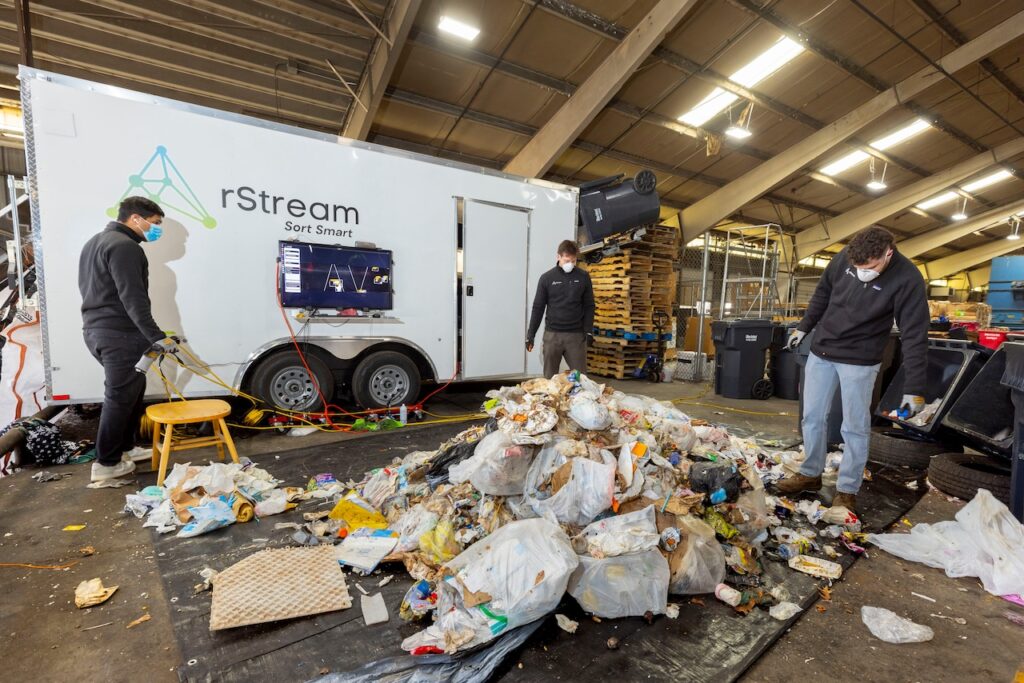AMHERST — Recycling entrepreneurs Ian Goodine and Ethan Walko first met at UMass Amherst as freshman after joining a pickup soccer league.
“We played a lot that year,” said Goodine, CEO of rStream, the Somerville-based robotics startup he co-founded with Walko. “We were a very committed kickoff crew. When you figure out you can work together (on the field), soon you are collaborating on a bunch of cool things.”
Among the “cool things” to emerge from that pickup league was that they founded their innovative recycling company in 2020, while they were undergraduate mechanical engineering seniors at the University of Massachusetts Amherst.
Another is that this spring, they returned to their alma mater to roll out a newer system, even more sophisticated than the one they prototyped as students.
This one takes on the industry’s most pressing challenge: sorting.
The two have developed an AI-powered robot that scans trash and recyclables, and aims to identify all the so-called treasures before they are tossed into landfills.
That’s because recycling contamination costs industries hundreds of millions of dollars a year, as less than a third is actually recycled, according to a University of California, Berkeley report.

Recycling entrepreneurs Ian Goodine and Ethan Walko first met at UMass Amherst as freshman after joining a pickup soccer league. Since then, the two have developed an AI-powered robot that scans trash and recyclables, and aims to identify all the so-called treasures before they are tossed into landfills. (University of Massachusetts Amherst photo)University of Massachusetts Amherst photo
For Goodine and Walko, their rStream mobile sorting unit didn’t just rely on students, faculty and staff this spring to know the sorting rules at the campus center and dining commons.
The system photographed each item and used an advanced dataset to decide whether it was biowaste, recyclable, or a specialty item. Then, it was sent down a conveyor belt to its appropriate bin. Plus, it sorts the waste in record time, as much as one ton per hour, Goodine said.
Goodine and Walko’s final report on the prototype is on its way to UMass administration.
UMass officials hope the unit, if successful, can scale up and cover more of the campus, with its 32,000 students, 4,500 staff and 1,800 faculty— all in different locations.
Chancellor Javier Reyes, who witnessed the rStream trailer in action, said the team’s novel prototype system they explored as students will now help “address a critical campus need while advancing environmental sustainability.”
“Goodine and Walko’s ingenuity is a powerful example of the high-impact research and entrepreneurialism that defines UMass Amherst,” he said.
Since graduating UMass with master’s degrees in 2022, the two have raised $3 million and developed extensive datasets that are designed to recognize and sort thousands of types of waste, from standard recyclables to tricky items, like ketchup bottles and jelly jars. The goal: to boost recycling rates, create sellable clean materials for waste companies and reduce the landfilling of valuable recyclables.
In fact, the UMass Dining Commons and waste facilities taught the rStream mobile unit a thing or two. AI is customizable, after all, and learns as it works — different buildings, cities and waste companies mean different recycling rules.
With precise information from rStream, several waste contractors at the university can “more easily identify markets for that waste,” said Kathy Wicks, director of UMass dining sustainability.
“This moves us closer to being able to have plastic material from campus that can come back around as clothes or other consumer goods featured in the UMass store,” Wicks said.
Walko, rStream’s chief technology officer, said, “Waste can take many forms at loading docks and transfer stations, so working with UMass to get us into those spaces is key to modeling what improvements our technology can make.”
Walko and Goodine first worked in an advanced UMass polymer lab and then had simultaneous senior design projects as undergraduates. There, students may work on either an industry-sponsored project or a student concept. The two set up rStream and became the industry sponsor, with 25 students who worked on “our student projects despite the fact that we were also seniors with them in the course.”
Among the monetary awards were those from the National Science Foundation and the Massachusetts Clean Energy Center, which allowed the team to scale up, Walko said.
The team actually returned to campus last year to pilot a system that successfully audited waste at the Campus and Mullins centers, and Worcester Dining Commons, Walko said.
As for growing rStream, the two agreed that it’s a job at a time. They had to rent a truck to pull their mobile recycling sorting trailer out to Amherst from Somerville.
“We don’t have the money to buy a pickup truck right now,” Goodine said. “Maybe later we will buy one.”


